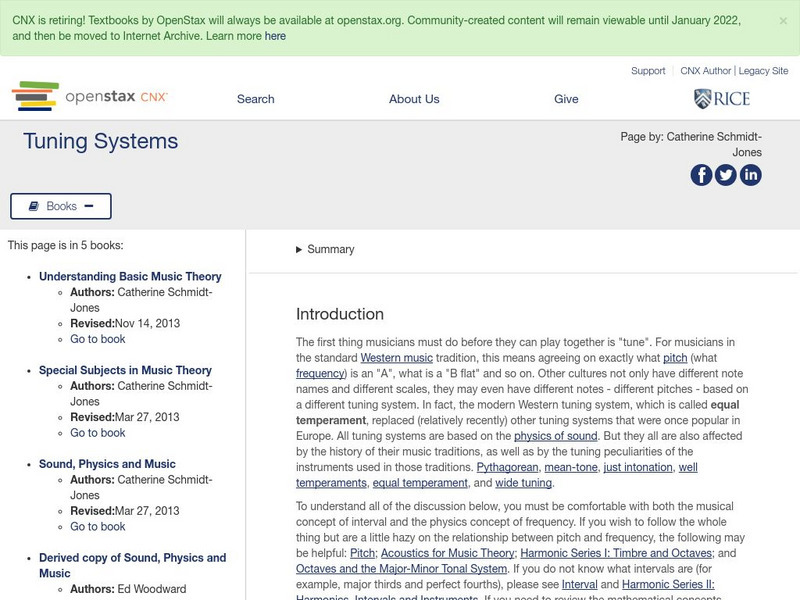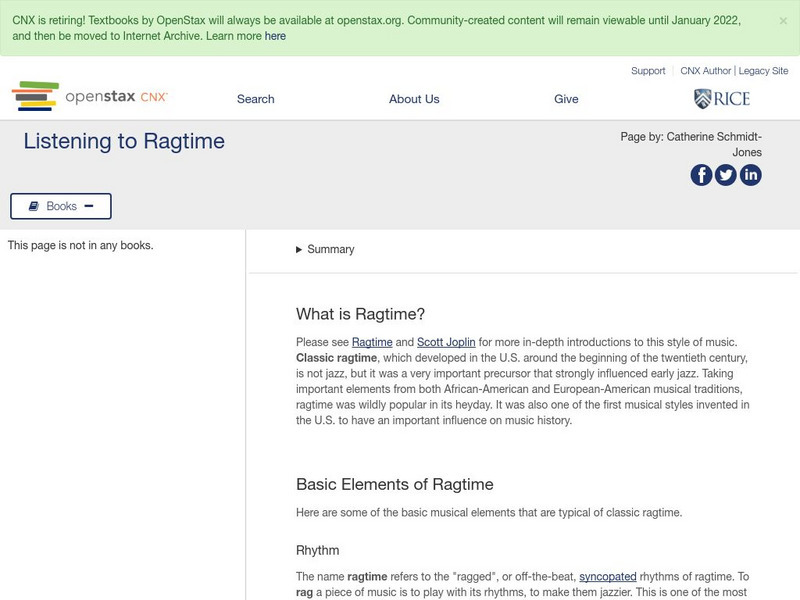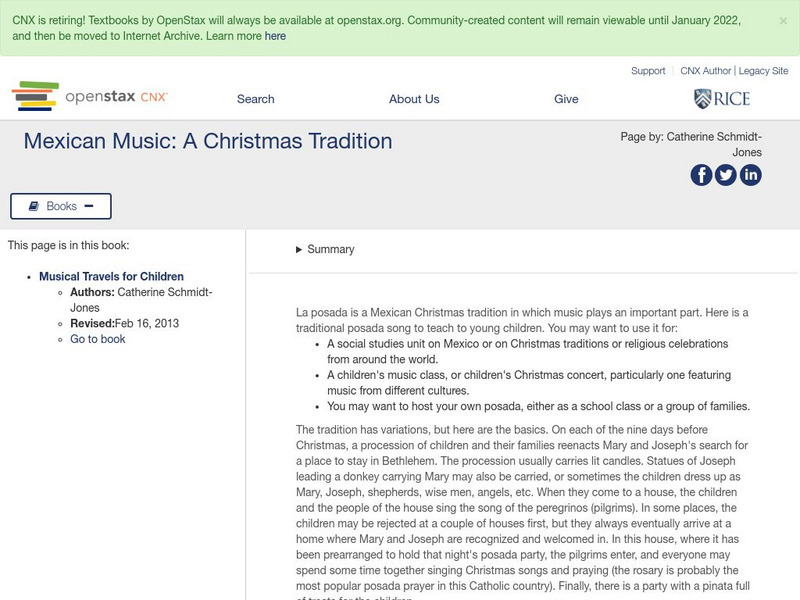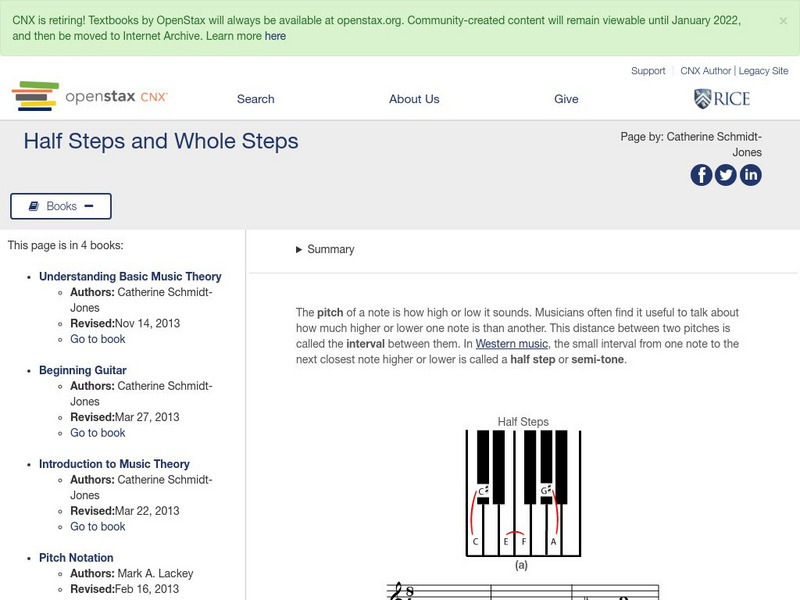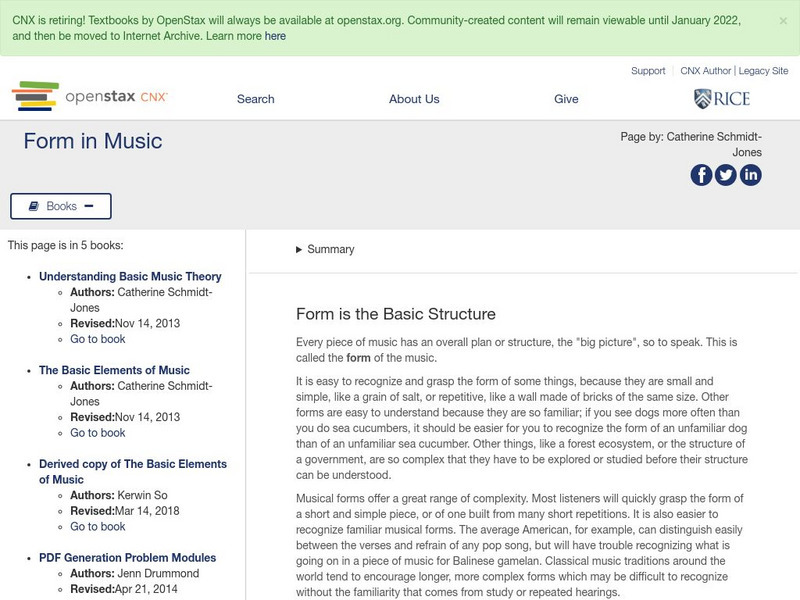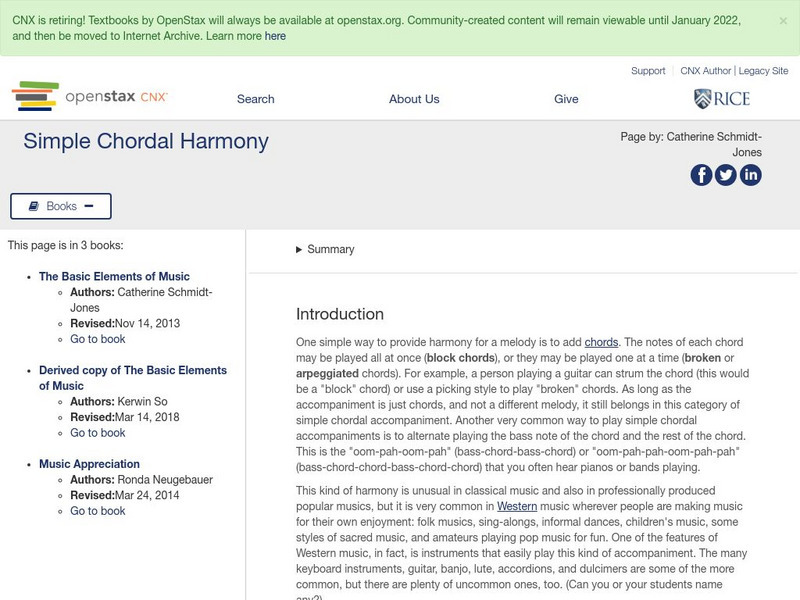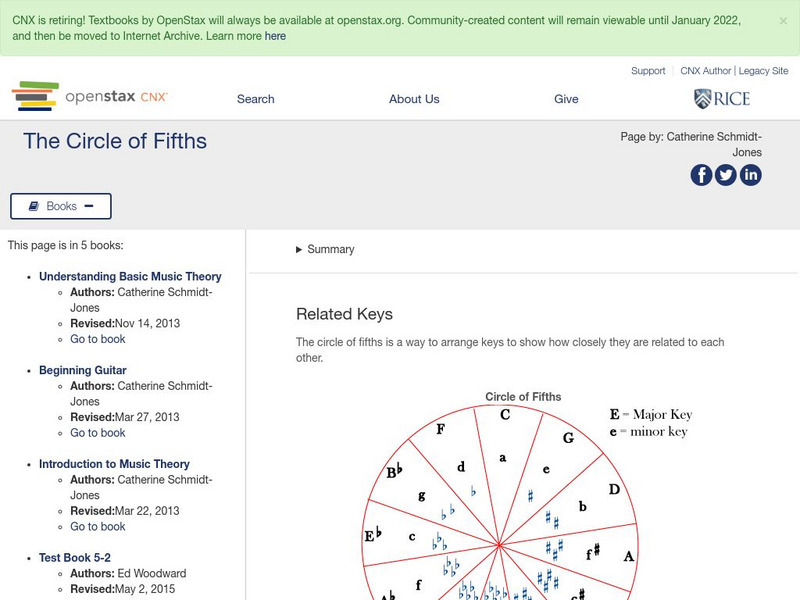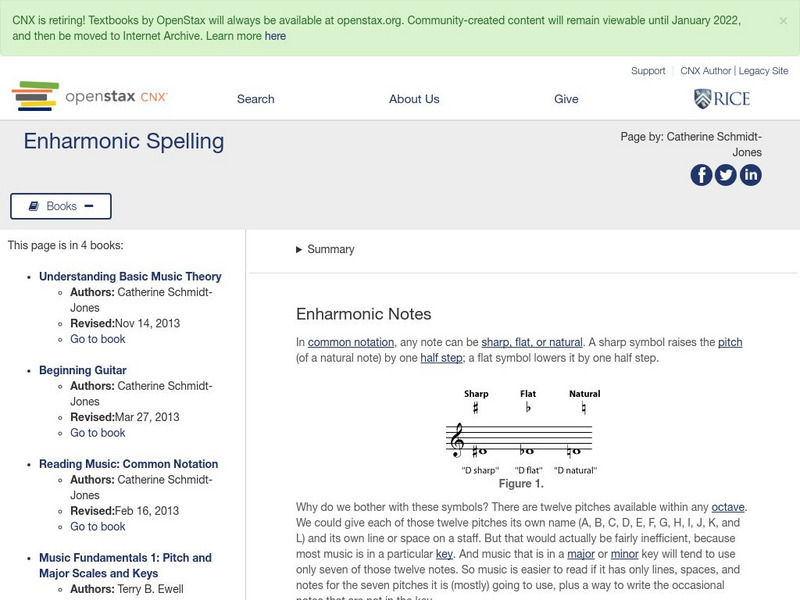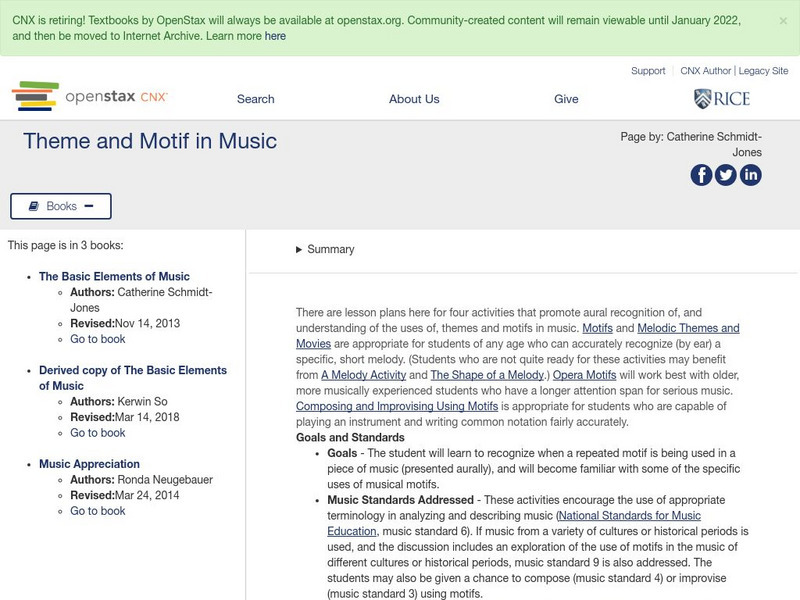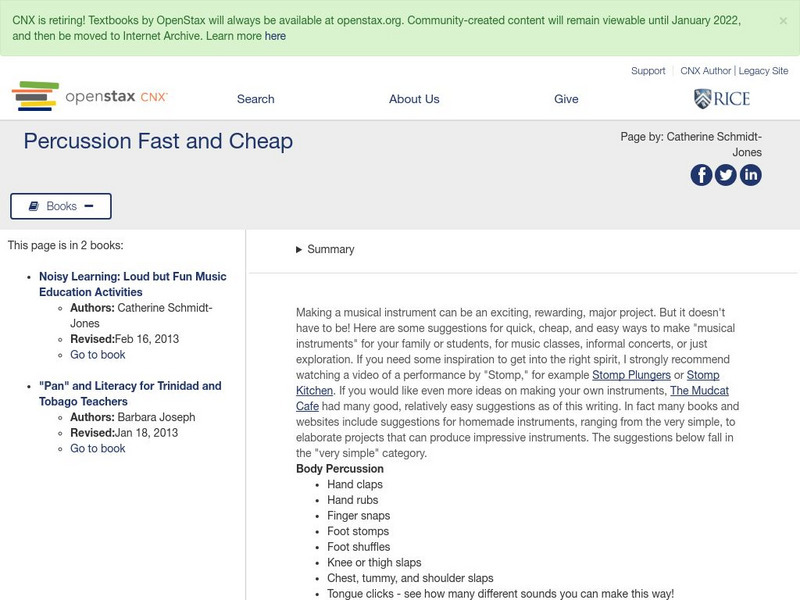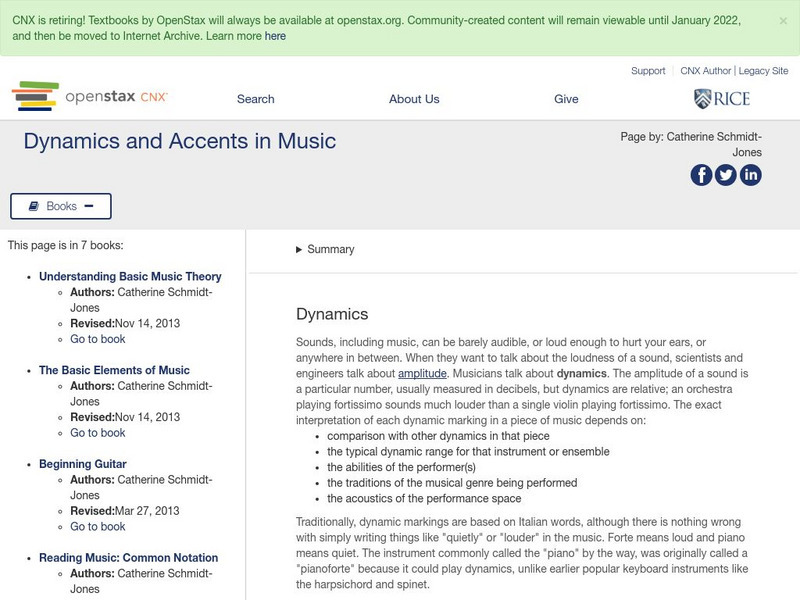OpenStax
Open Stax: Catherine Schmidt Jones: Scoring Music: Write for Specific Instruments
If you are interested in arranging your own music, you should check out the tips offered at this website. Including a history of how music was arranged, this site also gives several good ideas of how to make your arrangements interesting.
OpenStax
Open Stax: Catherine Schmidt Jones: The French Horn
Here is a web page introducing the French horn. Included is a brief history of the instrument as well as audio clips and pictures.
OpenStax
Open Stax: C. M. Sunday: Music/math/literacy Unit
This instructional activity encourages students to actively participate while learning about music and math similarities. This site has many ideas and resources to help aid you in planning your instructional activity.
OpenStax
Open Stax: Catherine Schmidt Jones: Sound and Music
Introduce some activities that introduce students to the physics of sound. They will also learn how various instruments produce sound. Included are downloadable pdf worksheets and answer sheets to use.
OpenStax
Open Stax: Catherine Schmidt Jones: Tuning Systems
Here is a good introduction to the various tuning systems. Topics covered are Tuning Based on the Harmonic Series, Pythagorean Intonation, Mean-tone System, Just Intonation and more. This is also available as a printable pdf file.
OpenStax
Open Stax: Catherine Schmidt Jones: Melody
Learn about one of the basic elements in music, melody. Discover the ideas of melodic shapes and phrases as well as motifs and themes, and how to present these topics to children.
OpenStax
Open Stax: Catherine Schmidt Jones: Listening to Ragtime
An excellent resource explaining the details that characterize ragtime music. From the rhythms to the typical form, this site gives a great overview of this early style of jazz.
OpenStax
Open Stax: Catherine Schmidt Jones: Mexican Music: A Christmas Tradition
Learn about the Mexican Christmas tradition La Posada in this activity. Provided is the music and lyrics to a traditional posada song. The lyrics are available in both Spanish and English.
OpenStax
Open Stax: Catherine Schmidt Jones: Half Steps and Whole Steps
Take a look at the two intervals of the half step and whole step and how they make up the chromatic and whole tone scales. This page includes a couple of self checking problems to test your knowledge.
OpenStax
Open Stax: Catherine Schmidt Jones: Form in Music
This is a great resource for understanding and teaching musical forms to students. It thoroughly explains the various forms and provides activities to do with your students.
OpenStax
Open Stax: Catherine Schmidt Jones: Simple Chordal Harmony
This is an activity that teaches students how to add simple chords to a melody. Included are several activies and procedures to help with implementation.
OpenStax
Open Stax: Catherine Schmidt Jones: Pitch Sharp, Flat and Natural Notes
Learn about the meanings and uses of pitch and accidentals. Including sharp, flat, natural and double sharps and flats, this lesson explains why they are necessary.
OpenStax
Open Stax: Catherine Schmidt Jones: The Circle of Fifths
A way of organizing the various key signatures, the circle of fifths is a good tool to help visualize the relationships of the different keys. This tutorial includes several self checking quizzes to test your knowledge.
OpenStax
Open Stax: Catherine Schmidt Jones: Enharmonic Spelling
Understand what enharmonic notes are and why they are needed. Included are several self checking problems to test your knowledge.
OpenStax
Open Stax: Catherine Schmidt Jones: Scales That Aren't Major or Minor
As the title suggests, this site defines and gives examples of various other types of scales including chromatic, whole tone, blues scales and more.
OpenStax
Open Stax: Lydia E. Kavraki: Protein Folding
This module introduces students to the problem of Protein Folding, its importance, and current computational methods used to attack its complexity.
OpenStax
Open Stax: Catherine Schmidt Jones: Keys and Scales Are Sets
Help your students identify sets and intersections of sets with this musical activity. Using the concept of key signatures, students will learn that scales are sets of notes. Included with this lesson plan are downloadable worksheets and...
OpenStax
Open Stax: Catherine Schmidt Jones: The Staff
The staff and all of its parts are explained in this very easy to understand tutorial. This lesson can also be downloaded as a pdf file.
OpenStax
Open Stax: Catherine Schmidt Jones: Theme and Motif in Music
Explore a set of activities covering motif, opera motif, and melodic themes and movies. Several ideas and procedures are listed to help you teach this musical concept to your students.
OpenStax
Open Stax: Catherine Schmidt Jones: Percussion Fast and Cheap
Here are some great ideas to assist you in helping your students make their own percussion instruments with little or no money.
OpenStax
Open Stax: Introduction to Sociology: Theoretical Perspectives on Deviance
Why does social deviance occur? Read about three theories that are grouped according to the three major sociological paradigms: functionalism, symbolic interactionism, and conflict theory.
OpenStax
Open Stax: Catherine Schmidt Jones: Dynamics in Music
This lesson focuses on the use of dynamics in music. Learn what the most common terms mean. Includes several activities to use with your class.
OpenStax
Open Stax: Catherine Schmidt Jones: The Shape of a Melody
Here is a lesson plan that will allow your students to learn about melodies and their shapes. Recognizing when the notes are high or low and if they move up or down will help your students understand melodic contour.
OpenStax
Open Stax: Catherine Schmidt Jones: Germanic Music: Christmas Carols
Two Christmas carols are taught in this lesson plan, Silent Night and O Tannenbaum. Students will learn the carols in German and English. They will also learn the background and history of each of these well known carols.




